INTRODUCTION
The International MFA (IMFA) program at China Academy of Art has been developed in response to the rapidly increasing globalization of the art world. In the past two decades, the world has seen the rapid expansion of art and ideas beyond old boundaries and obsolete cultural constructs. Today, artists from throughout the world – particularly China – are emerging as the seminal artists of their times. Throughout the 20th Century the world’s most famous and most highly valued artists have been almost exclusively from Europe and America. In the past 15 years, the East Asian (China, Korea and Japan) art scene has exploded with numerous new major museums of both traditional and contemporary art being built throughout China. The de-decentralization of the art world has already taken place. The advent of digital venues for the dissemination and discussion of new art has also eliminated the nexus between art and nationality. The ascendency of non-European art and artists has profoundly altered the ways in which young and emerging artists throughout the world must be educated.
The mission of International MFA program (IMFA) at China Academy of Art (CAA) is to introduce the world’s most promising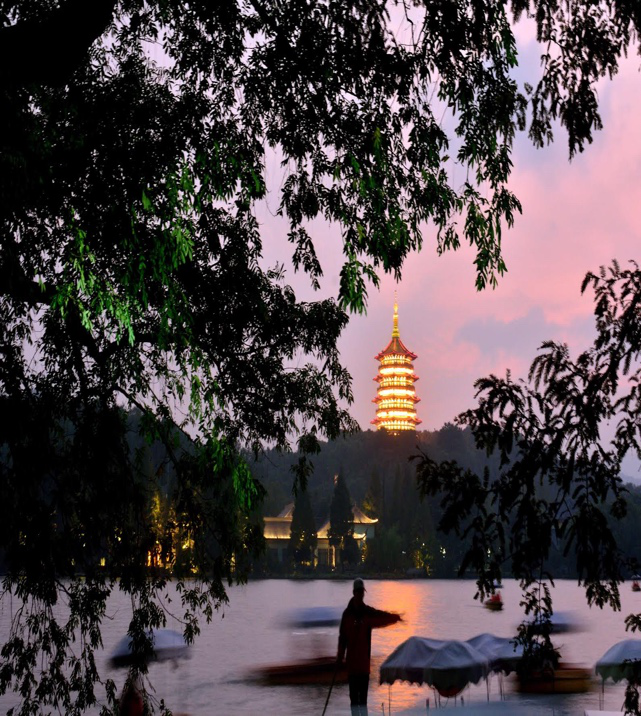 young artists to a new world of contemporary art – an art world in which the creative and expressive practices from around the world join together to create art that is as vital and innovative as the contemporary world itself. Faculty and students from around the world bring a new vision to this innovative program.
young artists to a new world of contemporary art – an art world in which the creative and expressive practices from around the world join together to create art that is as vital and innovative as the contemporary world itself. Faculty and students from around the world bring a new vision to this innovative program.
The IMFA curriculum explores the newly emerging paradigms of relationality, multi-culturalism, social practice and extended media that have defined the world’s most exciting contemporary art for the past quarter of a century. Science, economics and technology are also considered in the curriculum as integral to contemporary concepts of art and culture .
The core of our curriculum is the relationship between international students and faculty – the community who comprise the IMFA program. We form an active and vital community of artists dedicated to a new vision of world art. The IMFA takes maximum advantage of the re-location of its students into a new cultural identity which explores the realities of life in a world where they suddenly become ‘the other’. It provides a situation where new forms of communication and exchange re-create identity and the concept of cultural relevance and creativity. Deep interpersonal relationships and increased cultural awareness form a nucleus for robust exploration of important new ideas. The spectacle of culture itself becomes the foundation for innovation and creative life. From that core experience, new ideas about culture and meaning will fuel the creative furnace that forges radical new concepts and extensions of ancient traditions into present-day artistic practices. Required courses in Chinese language and culture not only extend IMFA students’ familiarity with new cultural ideas, but also enable first-hand dialogue with Chinese artists as well as CAA faculty and staff. IMFA students demonstrate proficiency in Chinese language by passing the Chinese national HSK3 examination prior to graduation.
GENERAL INFORMATION
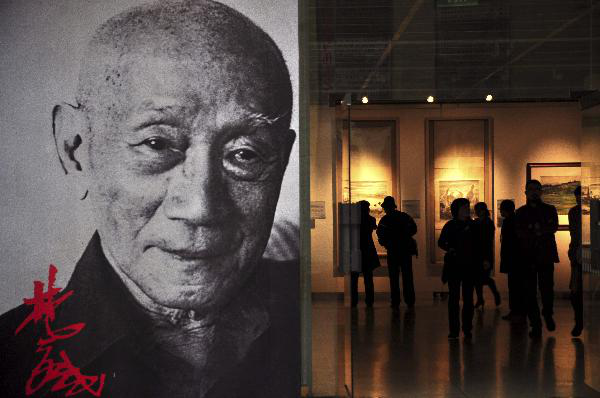 The China Academy of Art is one of China’s oldest and most prestigious art colleges. CAA has three campuses – one in Shanghai, and the two main campuses in Hangzhou. All campuses include state of the art facilities – studios, digital access, libraries, museums and galleries as well as comfortable and well appointed student housing. The combined enrollment of CAA campuses is currently around 12,000 including graduate and undergraduate students from all over China, and around the world. The main CAA campuses (Nan Shan and Xiang Shan) are located in Hangzhou, often cited as China’s most beautiful city – famous for art, tea and silk. Hangzhou is located approximately 125 kilometers southwest of Shanghai, putting CAA in easy reach of Shanghai’s world class cultural and technological institutions. Graduates of the China Academy of Art are among China’s leading artists and are currently very active internationally.
The China Academy of Art is one of China’s oldest and most prestigious art colleges. CAA has three campuses – one in Shanghai, and the two main campuses in Hangzhou. All campuses include state of the art facilities – studios, digital access, libraries, museums and galleries as well as comfortable and well appointed student housing. The combined enrollment of CAA campuses is currently around 12,000 including graduate and undergraduate students from all over China, and around the world. The main CAA campuses (Nan Shan and Xiang Shan) are located in Hangzhou, often cited as China’s most beautiful city – famous for art, tea and silk. Hangzhou is located approximately 125 kilometers southwest of Shanghai, putting CAA in easy reach of Shanghai’s world class cultural and technological institutions. Graduates of the China Academy of Art are among China’s leading artists and are currently very active internationally.
FACILITIES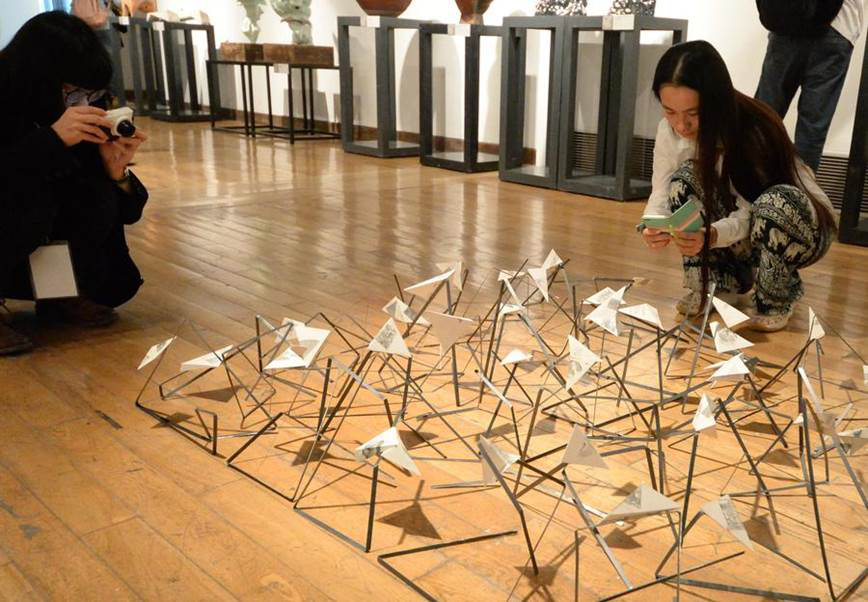
IMFA students have access to modern and well equipped studio spaces supporting students’ art work in virtually every studio discipline. Access to up-to-date digital equipment and software ensures that IMFA students are able to fully interact with the current leading edge technologies which are re-defining art and culture around the world. Digital labs and fabrication equipment ensure students have the capability to develop new ideas and technologies in cooperation with leading international faculty and in art, technology and design. Lecture and discussion spaces are digitally equipped with world-wide links for conferencing and exchange of images and ideas. Students are assigned to individual studio work areas located in the International College at the Xiang Shan campus.
COMPLETING THE IMFA PROGRAM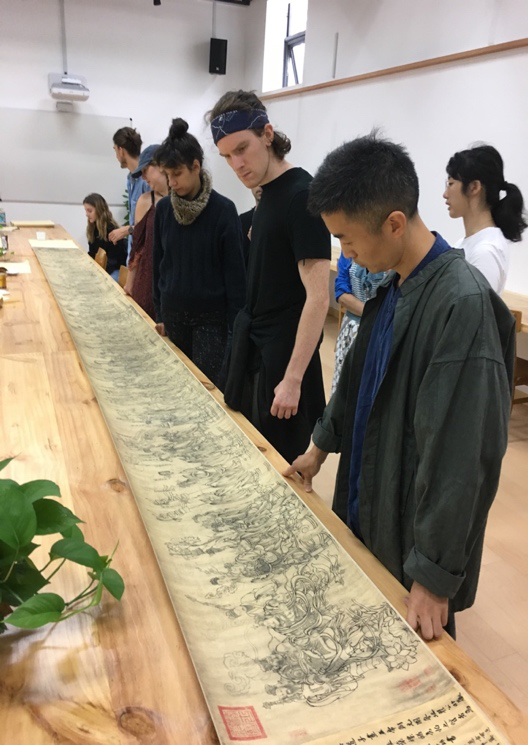
The IMFA is a three-year residential program. There are no part-time or limited residency students. At the conclusion of the first year, students’ portfolios are expected to show a focused body of advanced art work that demonstrates skill, creativity and conceptual ability. In order to advance to candidacy for the IMFA degree, portfolios must reflect a technically and conceptually sophisticated body of work suitable for exhibition in a professional venue. In the first year students are encouraged to experiment with new and innovative approaches to art-making. New philosophical and conceptual perspectives are introduced and integrated into each student’s artistic development. Students receive comprehensive reviews and critiques at
the end of each semester. After the first year, each student is reviewed and evaluated by the faculty to determine their suitability for further study – advancement to candidacy.
In the second year, each student selects a Master Tutor who works with them closely through the final two years of the IMFA. These years are spent honing and resolving the artwork until it represents a truly innovative and professionally accomplished body of artwork. During this time, students also work with their Master Tutor to develop and write their Thesis Statement which requires extensive academic research pertaining to the students’ areas of artistic work. The Thesis Statement contextualized the artist’s oeuvre within an expanded international cultural context. Students are awarded the Master of Fine Arts Degree from China Academy of Art, upon the successful completion of all required courses and presentation of final artwork and written thesis. Academic records are maintained in Chinese and English.
LANGUAGE
All classes required for IMFA students, are conducted in English or are simultaneously translated into English by CAA’s professional translation staff. No prior knowledge of Chinese language is required for admission. Fluency in English is assumed for all entering IMFA students regardless of national origin. All applicants from non-English speaking countries must submit results from either TOEFL (Test of English as a Foreign Language) or IELTS (International English Language Testing System). Since proficiency in English is a prerequisite for acceptance, applicants must attain an acceptable score on either test; IMFA requires a minimum result of 90 on the TOEFL or 6.5 on IELTS.
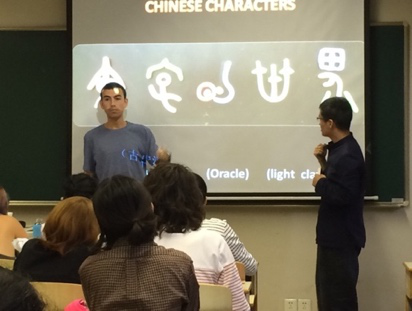
IMFA Chinese Art and Culture class
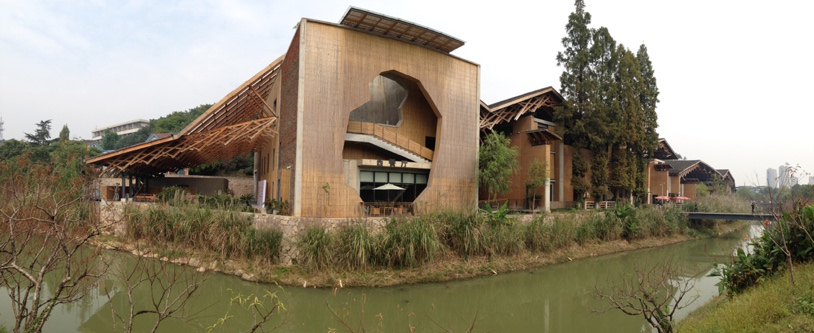
Xiang Shan Campus – architecture by Prof. Wang Shu
LIVING AT CHINA ACADEMY OF ART 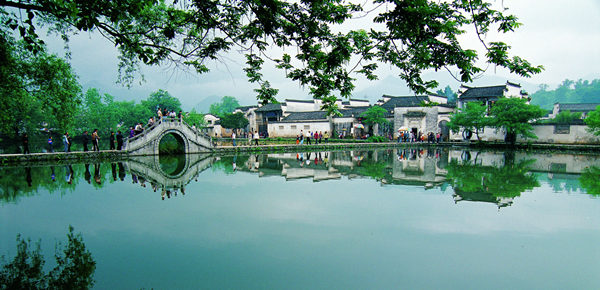
The dormitory facilities at CAA are clean and modern. Students receive semi-private accommodation with shared bathroom facilities. Students in the IMFA live in the foreign student dorm but share dining facilities with all CAA students – graduate and undergraduate. Food is generally traditional Chinese fare. The cafeteria style facility is in the same building as the Foreign Student Dormitory. Classes are offered on both the Nan Shan and Xiang Shan campuses – about 20 km apart. The IMFA program is based on the Xiang Shan campus and student dorms and studios are also located there. CAA provides regular shuttle busses between the two campuses. Convenient and inexpensive public transportation is also available. There are innumerable private restaurants nearby the Hangzhou campuses representing a variety of ethnic tastes – including a variety of International fast food chains. The Nan Shan campus is located near the beautiful West Lake – surrounded by exquisite parks, gardens and restaurants. It is one of Chinas premier tourist destinations. The Xiang Shan campus is located on a 200-acre park-like campus with numerous ponds and wooded areas as well as three on-campus museums, and numerous studio facilities for all media. The IMFA students interact frequently with the larger CAA student body including both graduate and undergraduate programs. Chinese students are famous for their friendliness, curiosity and the intensity of their commitment to learning. One of the oldest axioms of education is, ‘students often learn more from each other than from their teachers’
HEALTH
The China Academy of Art maintains an on-campus dispensary and there are numerous clinics and hospitals nearby both campuses. All students are required to have medical insurance provided by the Academy at a minimal cost. There are exercise facilities and athletic fields available for student use on both campuses. Numerous state certified practitioners of traditional Chinese Medicine and health special health practices are also available to students nearby at marginal cost.
AFTER GRADUATION
The curriculum of the IMFA is intended to train artists of the highest caliber to participate in the cultural dialectic – the world of international contemporary art. Graduating students are prepared first and foremost to be fully functioning contemporary artists. Alumni will exhibit their artwork internationally, participate in dialogues and discussions through print and internet media, to teach in the world’s most advanced and prestigious art colleges. CAA actively assists graduates in the marketing and promotion of their artwork internationally including important connections to galleries, publications and museums. By virtue of their affiliation with one of China’s leading art colleges, and their familiarity with Chinese language and cultural history, IMFA graduates will have unparalleled access to the Chinese art world. Graduates of the IMFA are qualified to teach in professional art colleges anywhere in the world. The China Academy of Art is fully recognized and accredited by the China Ministry of Education and the Ministry of Culture. It is an international affiliate of the American Association of Independent Colleges of Art and Design (AICAD).
ADMISSION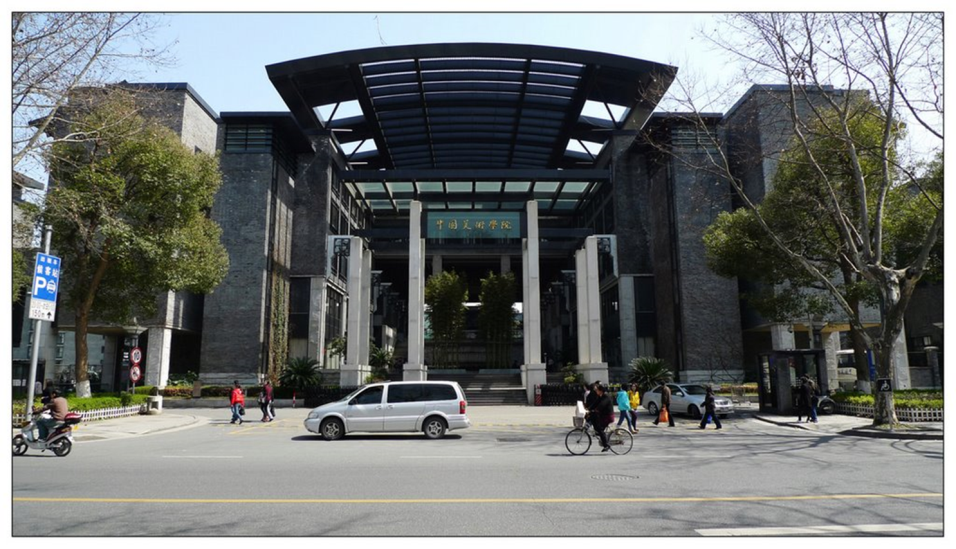
Admission to the CAA IMFA is selective. Emphasis is placed on applicants’ artistic achievement, commitment to cross-cultural exploration and academic potential. The goal of the admissions process is to bring together extraordinary individuals who will form a powerful environment that both challenges and supports new approaches to art and design.
A committee of faculty carefully reviews all applicants to the IMFA and selects those whom they believe are most capable of helping to develop the highest levels of innovation and achievement in the IMFA community. Artists and designers working in any media or genre are invited to apply to the program based on their past experience, current level of artwork and their interest in both the technical and conceptual foundations of international art.
TUITION AND SCHOLARSHIPS
For Fall 2019, ten applicants will be offered a full scholarship (known simply as the Chinese Government Scholarship), offered by the China Ministry of Education. Scholarship recipients receive full tuition and housing at no cost. A living stipend will be paid monthly(3000RMB), directly to the student’s Chinese bank account. Scholarships do not include travel to and from China. Applicants from all countries are considered for the Chinese Government Scholarships.
Scholarships may be awarded based on artistic merit and academic achievement of applicants. Each year, a specific number of scholarships are reserved by the Chinese Government for citizens of the Unites States. Other nations may also be recognized in this manner based on Chinese Government policy and availability of funding. Students are generally responsible for the cost of their own art materials, beyond their living stipend, as well as transportation to and from Hangzhou. Additional scholarships and financial support may be available from a variety of other sources including Zhejiang Provincial Scholarship.
ANNUAL COSTS
· Annual tuition for full-time study in the IMFA program is RMB 60000yuan (Approximately USD$8571)
· Room and Board charges are RMB 2000/month (USD$300). Students live in the Foreign Student Dormitory and the CAA dining hall is located near the dorm, at the Xiang Shan Campus.
CURRICULUM & CALENDAR
The International MFA is operated through the International College at the China Academy of Art in Hangzhou. Students are admitted from all artistic backgrounds with an emphasis on expanding and enriching studio practice and moving into contemporary genres. The IMFA program requires 72 semester units of degree credit for completion over the course of three academic years. Students are enrolled full-time for two semesters each year: Fall semester from September until mid-January, with a one-week break in October, and Spring Semester which begins in late-February and continues through early July. A detailed schedule of classes and academic calendar is provided to students at the start of each semester. Students work independently in specially assigned individual studios. In the first year, they enroll for Individual Tutorials with distinguished working artists from around the world, both regular CAA faculty and a distinguished group of International Advisory Faculty who serve each year as visiting artists for limited periods of time at the Hangzhou Campus and by Internet.
In the second year they select a Master Tutorial faculty from among either Chinese or International faculty. This Master Tutorial serves as the focus point for students work for the next two years on the conceptualization and completion of the IMFA Thesis Statement. Students meet individually with their tutors at regular intervals to examine their own artwork in close detail from both a technical and philosophical perspective. These tutorials allow each student to develop their own unique artwork with the guidance and support of a variety of highly experienced faculty from their respective areas of artistic interest.
Artworks created by students are also discussed and strengthened through weekly Interdisciplinary Studio Seminars required each semester. These seminars explore the technical, aesthetic and conceptual issues of each student and provide a l community of fellow artists who are both supportive and challenging. Students develop critical vocabulary and the ability to visually and conceptually describe and respond to each other’s artwork. Each Seminar is led by a faculty member – either on site or by Internet ‘ZOOM’. Group critiques offer students a diverse and provocative community through which their ideas and images can be fully examined and discussed from a variety of cultural perspectives. Individual Tutorials and Interdisciplinary Critique Seminars are further enhanced through a variety of uniquely designed IMFA courses in Studio Art Electives. These courses ranging from one week ‘intensives’ to full semester classes allow students to explore technical, conceptual historical and philosophical issues in contemporary art as well as their connection to the practical ‘hands-on’ issues of fabricating objects and spaces which become relevant to contemporary world culture. Resident and Visiting faculty in a broad range of subject areas are available to enhance the academic concepts that form a framework for the creation of relevant and provocative artwork in the contemporary international art world. These special courses may be team-taught by faculty from different academic backgrounds to address the unique issues facing contemporary artists in the world art scene. Studio Elective courses will be supplemented with required courses in Liberal Arts - Theory and Criticism – courses which explore the academic issues of art, technology, history, philosophy and sociological theory that are re-defining the art world.
Required first-year and second courses in Chinese Language and Culture offer Chinese language, Calligraphy, Art History and Cultural Philosophies of China, as well as other topics. All IMFA students are expected to have achieved a working knowledge of both written and spoken Chinese language. Students are required to satisfactorily complete the Chinese national HSK3 Examination for Chinese language prior to graduation.
All IMFA courses are taught in English, or in Chinese (or another language) with English translators. Course work will be offered on both the Nan Shan and Xiang Shan campuses in Hangzhou, and through the Internet with faculty from around the world. Courses will take advantage of local resources such as exhibitions, historical site visits, Museum and Gallery tours or other activities connected to the contemporary art worlds in and around Hangzhou as well as extended study in other Chinese cities such as Beijing and Shanghai. These courses often involve assigned reading and writing projects in addition to class lectures and discussions and studio art projects.
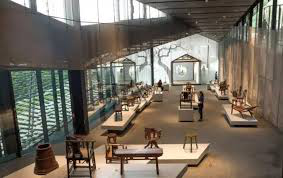
CAA Museum of Craft – Xiang Shan Campus
IMFA COURSE REQUIREMENTS – DEGREE COMPLETION

YEAR 1 SEMESTER 1
Interdisciplinary Studio Seminar
Elective Tutorial
Liberal Arts Elective
Studio Electives (All Studio Disciplines)
Chinese Language and Culture (Chinese Language, History and Traditional Arts)
SEMESTER 2
Interdisciplinary Studio Seminar
Elective Tutorial
Liberal Arts Elective
Studio Electives (All Studio Disciplines)
Chinese Language and Culture (Chinese Language, History and Traditional Arts)
First Year Review
YEAR 2 SEMESTER 1
Interdisciplinary Studio Seminar
Master Tutorial– Art and Social Structures
Studio Electives (All Studio Disciplines)
Chinese Language
SEMESTER 2
Interdisciplinary Studio Seminar
Master Tutorial
Liberal Arts Elective
Studio electives
YEAR 3 SEMESTER 1
Interdisciplinary Studio Seminar
Master Tutorial
SEMESTER 2
Interdisciplinary Studio Seminar – Preparation for Final Group Exhibition
Master Tutorial
IMFA Thesis
Final Review - Graduation
COURSE CATEGORIES
Individual Tutorial (1unit) Students work independently in individually assigned studio/work spaces. Faculty tutors visit the student’s space either in person or by Zoom, Skype or We-Chat, at least once every two weeks, for a total of eight hours over the semester, to discuss and critique art work completed in the intervening period as well offering insights into the creative process and individual conceptual issues central to the student’s artwork. The Tutorial validates the individual work spent in the studio. It is expected that each student spends a minimum of 30 hours each week involved in the creation and dissemination of their own art work. The tutorial ensures that this standard is met. Students normally earn 1 unit each semester for each tutorial. Typically work with two or three tutors is expected each semester.
Master Tutorial (3-5 units) Comprehensive individual instruction with a master tutor facilitates the integration of technical, formal and conceptual elements leading to a cohesive professional body of original art work. The Master Tutorial supports the student’s studio and academic work and forms the foundation for the summative IMFA Thesis submitted as the capstone experience of the IMFA Program.
Interdisciplinary Studio Critique Seminar (2 units) The Studio Critique Seminar is limited to 10 students who meet once a week for 3-4 hours to review and discuss the artwork completed by seminar participants. Special emphasis is placed upon critical analysis and insight of seminar members for each other’s artwork. Students are challenged and encouraged by the Seminar to stretch and strengthen the technical and conceptual elements of their work. The group ensures that IMFA students maintain the highest standards of artistic achievement. In addition to the faculty facilitator, an array of distinguished visiting artists from around the world will be invited in as guest facilitators of the seminar. In addition to discussing their own work they will respond to artwork presented by IMFA students in the seminar.
Liberal Arts/ History and Theory Electives (1-3 units) This requirement includes a wide variety of courses taught be visiting faculty, guest artists as well as CAA regular staff. Topics include areas related to art and culture, ranging from art history to contemporary sociological, philosophical and political aspects of contemporary culture. Classes may be taught on campus or on-line. Written assignments and independent research are required.
Studio Electives (1-3 units) Students will work within existing graduate studio areas – Painting, Sculpture, Ceramics, Metals, Glass, Photography, Video and Inter-media. Utilizing existing class structures and individual tutorials with selected faculty members, IMFA students will develop techniques and gain access to facilities needed to develop their own individual art work. Studio electives allow IMFA students access to studios and technical facilities at CAA. Students are expected to spend a minimum of three hours of studio time for each hour spent with faculty. Studio Electives may include formal classes on the CAA campuses or work done independently with CAA faculty. Access to studio areas is offered only with faculty permission in the intended studio area. Units vary depending on faculty availability.
Chinese Language and Culture Electives (1-3 units) variety of topics dealing with Chinese language and traditional culture. Courses such as Chinese art history, beginning to Intermediate courses in Chinese language, and traditional Chinese art practices such as calligraphy, bird and flower or landscape painting are offered. Intensive study of Chinese language is available to all IMFA students but is not required. Students are expected to pass the HSK-3 examination for proficiency in Chinese language prior to graduation.
HOW TO APPLY
All application material must be submitted on-line. Application forms must be filled out on the CAA Admissions web site. Academic transcripts, statements, recommendations, portfolios and necessary forms may be uploaded to the admissions application site. The Admissions process is two-tiered. The first application package is required for preliminary admission to the IMFA program – The second tier of requirements is required for final admission and consideration for China-US Culture Scholarship, and immigration material. All material must be submitted prior to April 15, 2019.
To apply for 2019 IMFA go to: http://admission.caa.edu.cn/
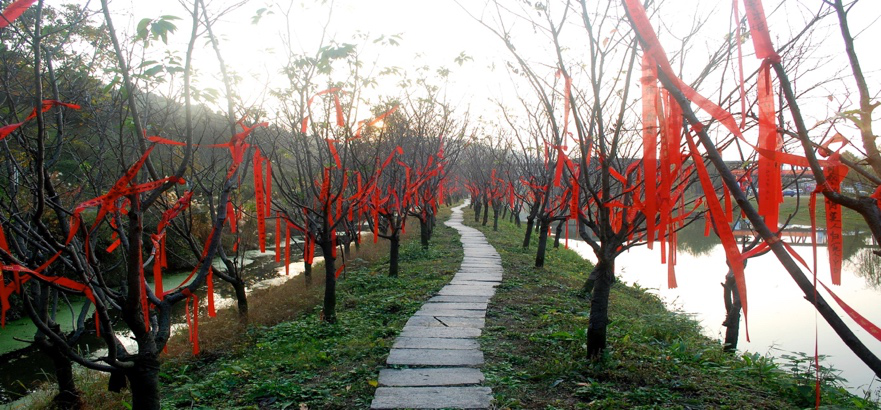
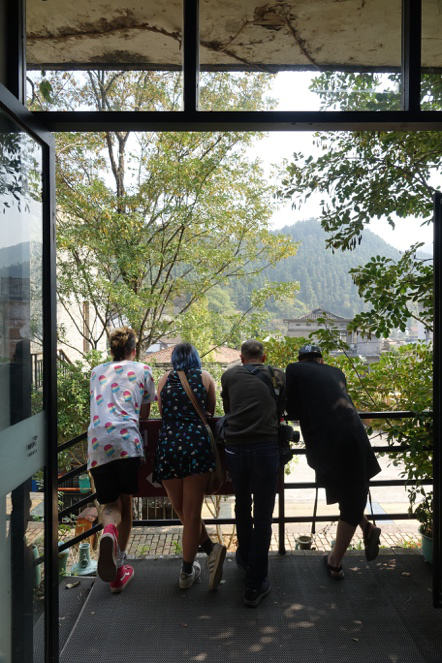
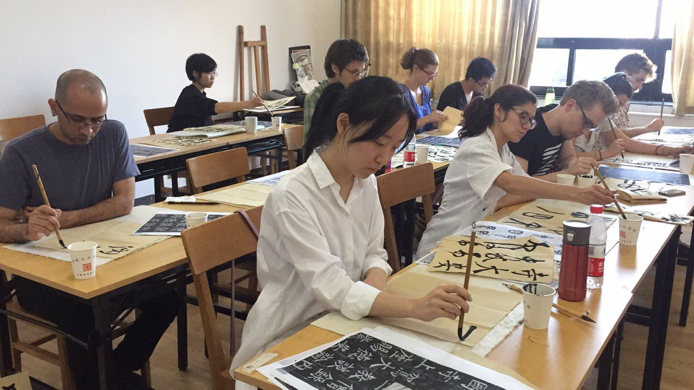
FIRST TIER REQUIREMENTS (DEADLINE April 1, 2019):
· Completed CAA IMFA Application Form. Forms should be printed, signed and sent as pdf files. No handwritten application forms will be accepted.
· Application fee of $125 – sent directly by bank transfer detailed instructions are ton the Financial Remittance form which is part of the CAA admissions packet
· Statement of Intent – Three to five pages, written in English, stating the nature of the applicant’s artwork (conceptual technical formal and material content) and their interest in the International MFA program in Contemporary Art. Include a discussion of the biographical and educational background that has led you into the field of art and specifically into the IMFA program. (.doc or .docx files – less than 1MB)
· Portfolio of original artwork – 12 images – submitted as a single MS PowerPoint (.ppt, or other similar) file with annotation for each image – title, date, medium and dimensions clearly indicated with each slide. Each image (jpeg or tif) used for the portfolio should be less than 500KB – total ppt file is not to exceed 5 MB. If video images are submitted (to CAAIMFA@caa.edu.cn), each file should be less than 5 minutes in length and less than 3 MB in size. All submitted art works should have been completed within the prior two years and reflect the student’s current artistic interests and achievements. Work submitted may be in any media, style or genre.
· Copies of all academic transcripts from any post-secondary institution attended (official stamps and sealed copies from the institution are required prior to final admission and visa material) of all classes completed at the post-secondary level as well as appropriate diplomas and leaving certificates. Preliminary student copies of transcripts should be uploaded to the CAA Admissions site as .pdf files.
· Two letters of recommendation from faculty or art-related individuals who are familiar with you and your artwork. Letters of recommendation should address the applicant’s potential for multi-media approaches to contemporary art and capacity for incorporating cultural diversity into their overall creative oeuvre. Uploaded to the CAA site as pdf files
· Official results of TOEFL or IELTS Examinations - for all applicants from non-English speaking countries. Scores must indicate preparedness for study in English at the graduate level – TOEFL 90; IELTS 6.5
SECOND TIER IMFA MATERIALS (Final Deadline April15, 2019) – all material to be directly uploaded to CAA web site as pdf files
· China State Health Form – must be completed by a qualified health care practitioner in the applicant’s home country.
· Chinese Government Scholarship Application Form
· Photographs of the applicant – full front face and profile view suitable for passport
· Copies of passport information page
· Certification of Finances Form
·
· Final official academic transcripts from all colleges attended
For more information about CAA:
http://en.caa.edu.cn/
ADVISORY TEAM OF INTERNATIONAL GUEST PROFESSORS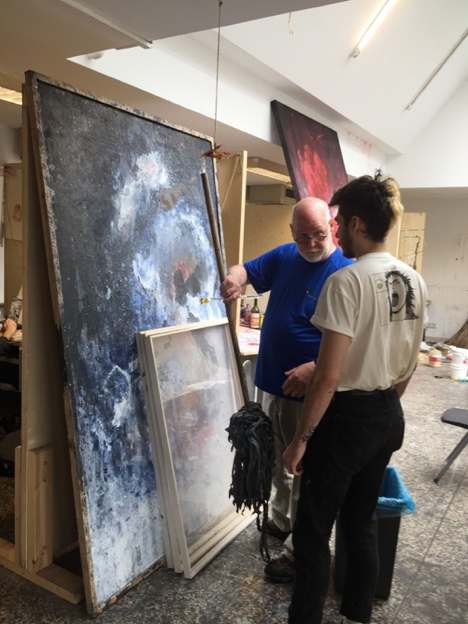
David Frazer, Professor, Chair of Painting Dept., Rhode Island School of Design
Michael Grady, IMFA Co-Director, Professor of Studio Art, Appalachian State University
Ken Horii, Professor, Rhode Island School of Design
Jeremy Morgan, Professor, San Francisco Art Institute
Ming Ren, IMFA Co-Director, Professor, Assistant to the President for China Affairs,
San Francisco Art Institute
Kuiyi Shen, Ph.D., Professor of Art History, University of California, San Diego
Grant Kester, Ph.D, Professor, University of California, San Diego
Hansong Zhang, Ph.D. Vice President of Engineering, Wearality Corporation
Jeannene Przyblyski, Ph.D, Provost, California Institute of the Arts
ADVISORY TEAM OF CHINESE PROFESSORS
Xu Jiang, Professor, President of China Academy of Art
Gao Shiming, PhD,Professor, Vice President of China Academy of Art
Huang Jiancheng, Professor, Deputy Dean of City Design, Central Academy of Art
Ma Gang, Professor, Central Academy of Art
Yao Dajun,Professor, China Academy of Art
Shi Ke, Professor, China Academy of Art
Gao Shiqiang, Professor China Academy of Art
Shen Leping, Professor, China Academy of Art
Zhang Aiguo, Professor, China Academy of Art
Chen Lei, Professor, China Academy of Art
Wan Muchun, Professor, China Academy of Art
MORE QUESTIONS? – CONTACT US
Ming Ren, lMFA Co-Director, mren@caa.edu.cn (650) 255-4647
Michael Grady, IMFA Co-director, gradyms@appstate.edu (510) 326-4208
International MFA Program
Room 203, No. 16 Building,
Xiangshan Campus,
352 Xiangshan Road,
China Academy of Art,
Hangzhou 310024,Zhejiang Province, P.R. China
![]() 1 IMFA 2019 Application Form.pdf
1 IMFA 2019 Application Form.pdf
![]() 2 PHYSICAL EXAMINATION FORM.pdf
2 PHYSICAL EXAMINATION FORM.pdf
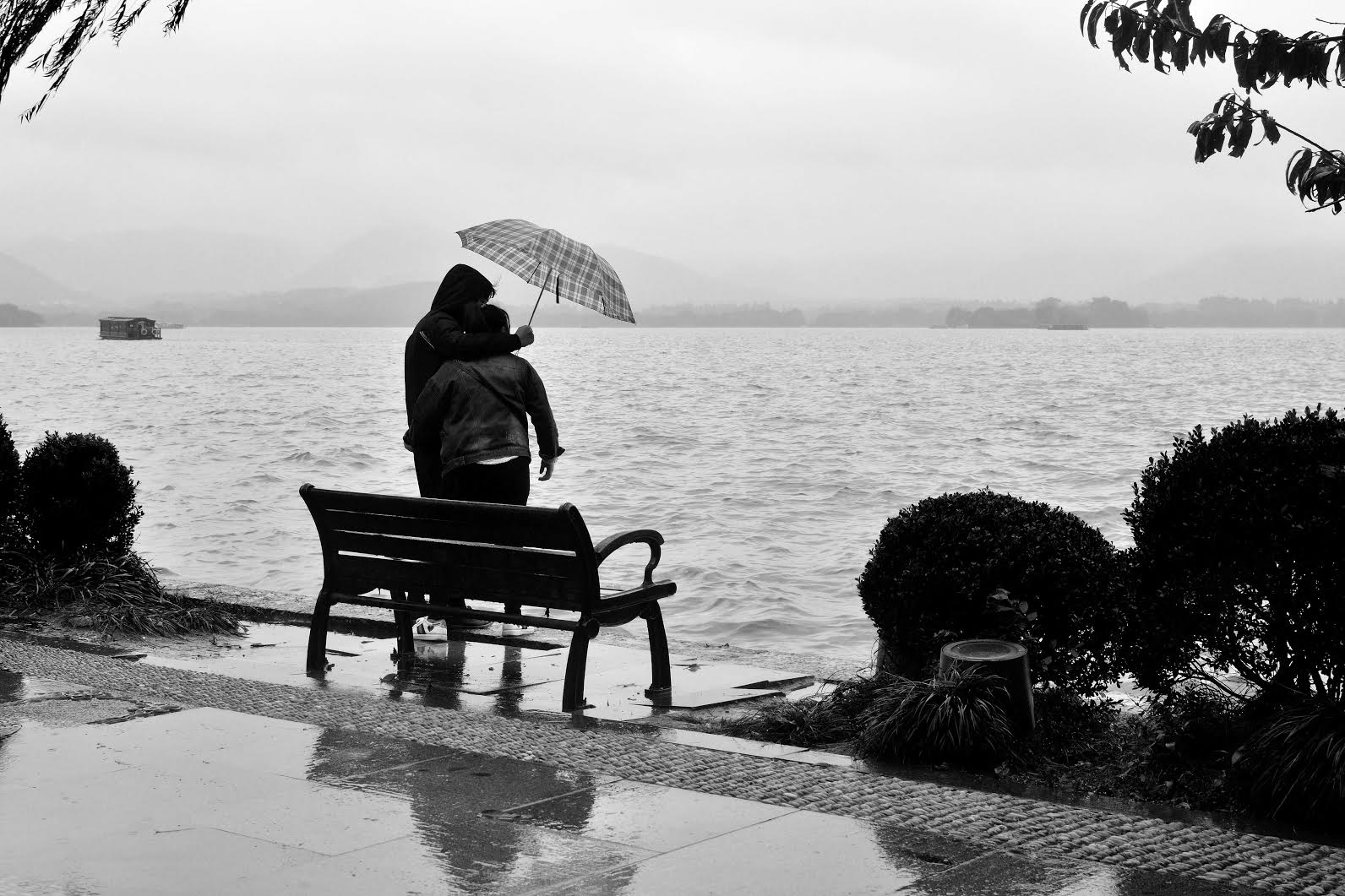
photo: Mahesh Singh IMFA





